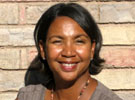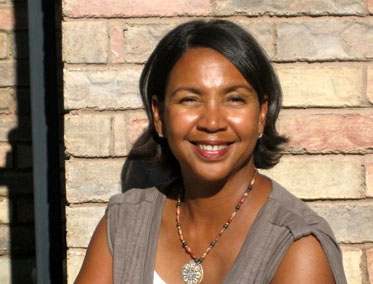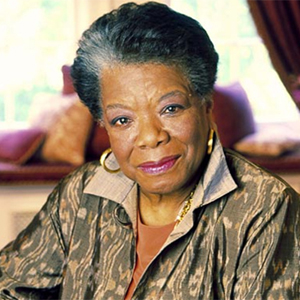Maya Angelou left an indelible mark on many of us
Prof. Karen Thomas writes about interviewing renowned poet Maya Angelou, who died May 28.

By Karen Thomas
Like so many, I deeply mourn the loss of poet Maya Angelou.
 Karen Thomas |
Three years ago, I had the pleasure of interviewing her as a freelance writer in Dallas after a performance at the Nasher Sculpture Center. She invited me to her hotel suite the next morning. When I arrived she was gracious, warm and hooked up to oxygen. She was frail, but she quickly explained her precarious health, flicked her hand to indicate that topic was done and we turned to food — the focus of her second cookbook just published that year. The cookbook, she said then, was her last and for her friends and family whom she nurtured with her legendary culinary skills. They begged her to write her recipes down.
"I want my books in people's hands and in their conversations, in their thoughts and in their minds," she told me about her work, which includes poetry and memoirs.
As the interview trailed from business to personal, I told her we had met before in 1986 in Accra, Ghana. Betty Shabazz, the widow of Malcolm X, was there and so was David DuBois, the stepson of civil rights activist W.E.B. DuBois, along with several former professors of mine from the University of Massachusetts at Amherst where the DuBois papers are housed. We had all come for a ceremonial reinterment of the remains of DuBois and his wife, playwright Shirley Graham DuBois.
Ghana at the time was just beginning its economic recovery and had not yet become a tourist draw for African-Americans. Its hotels were mostly empty and its marketplaces just beginning to stir again. I was a newly minted graduate and had won a travel fellowship to cover the ceremony. I was young, scared and an inexperienced writer and traveler, clinging to the group like a lifeline.
Sister Maya, who once lived in Ghana, and Sister Betty tucked me under their wings. I will never forget touring the Elmina Castle with them. The castle, now a popular tourist attraction, once piled slaves into unbelievably small dungeons before leading them through what is called the Door of No Return. There they were loaded onto slave ships for the Middle Passage. We stood in one of the dungeons and the experience was profound. The walls literally felt alive with the spirits that were once held there. I remember just standing there with my elders, looking out later at the sea, the waves thundering against the shoreline. Sister Maya and Sister Betty's regal presences and strong motherly instincts made me feel safe and loved.
 Maya Angelou |
I didn't tell Ms. Angelou then or even later, but that was the second time that she nurtured me. The first came during my childhood. As an introverted child growing up in the Bronx, N.Y., I lost and then found myself in books, experiencing the world with my library card. I remember reading "I Know Why the Caged Bird Sings" and not quite understanding Ms. Angelou's painful childhood. What I do remember connecting to is the beauty of her words, the pain of not fitting in and how reading poetry helped heal her. Her words helped feed my desire to become a writer.
And so it came to be three years ago that our paths crossed a final time. I sat in her Dallas hotel suite with the work now over, just enjoying her company. While we chatted, I pulled out a 1986 photo from Ghana and showed it to her. She laughed, called to her assistant to come see and then offered to sign my cookbook. When I added milk to my teacup while holding the cup in the air, she gently corrected me.
"It would be better if you set it down," she said.
Soon after came an invitation to her home for dinner. I thought she was just being kind. Her assistant assured me the invitation was real. I remember going home and telling my children and husband. I remember us all eagerly planning how we would happen to be in North Carolina so we could drop by her home. But time passed, and now I can only wish that I took her up on her offer.
I learned of Ms. Angelou's death on Wednesday via email from a dear friend. She called her a "beautiful and literary angel" who "left an indelible mark on many of us." And that is exactly right.
Rest well, Sister Maya. And thank you for my indelible mark.
Karen M. Thomas is a professor of practice at Southern Methodist University, where she teaches journalism. She worked at the Chicago Tribune from 1986 to 1992.